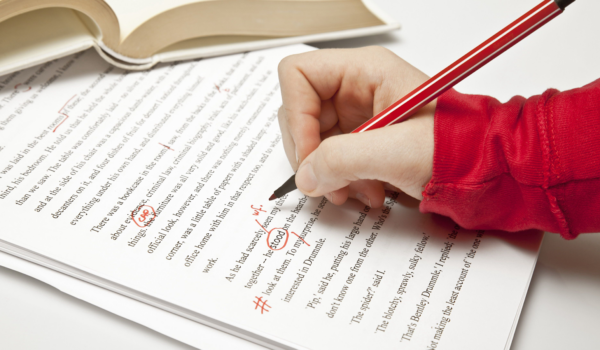
5 Valid Techniques to Increase Your Reading Speed and Comprehension
 How intriguing is the idea of speed reading? Have you ever fantasized about the ability to increase your reading speed? Do you daydream about skimming through your required readings while still having time to go out for nachos with friends after class?
How intriguing is the idea of speed reading? Have you ever fantasized about the ability to increase your reading speed? Do you daydream about skimming through your required readings while still having time to go out for nachos with friends after class?
In this post, we discussed the realities of speed reading. After discussing the science of reading, we concluded that though reading speed is a helpful tool for students, they should not rely on speed reading alone as their only means of study. The main issue with speed reading is that because it relies on the process of skimming, it limits comprehension. A lack of comprehension poses an issue for students. As such, we have developed this post, which offers 5 valid techniques to increase your reading speed and comprehension.
Why Are You Reading?
One of the first questions to ask when thinking about reading and learning is: why are you reading? In other words what is your goal as you set out to read a text? Are you aiming to read a text simply to pass your next exam or score well on an essay? Or are you more interested in reading the text to gain knowledge and wisdom that you can use in your future career?
These are important questions to consider when we discuss any form of learning. What is our ultimate goal when we attain an education? What are we ultimately doing with the knowledge we gain? If we think of the broader picture it might become clearer that we obtain an education to enhance our lives. Sure, we live in a fast-paced world, which necessitates that we are efficient with our time. But, in relation to our education perhaps we are more apt to be fulfilled if we focus on reading quality over reading quantity. Put another way, maybe we should think about learning speed over reading speed. Certainly, one of the reasons people choose to learn to speed read is that it has the capacity to increase their ability to consume more literature and information. But is that the goal here? When we emphasize speed over comprehension and learning quality, we minimize the effort we are making to increase our wisdom and education.
As B.B. King said, “the beautiful thing about learning is nobody can take it away from you”.
Our education is in our hands. We can choose how and what we learn. As this WIRED article suggests, it is not how fast we can read, but rather what we know that enhances our abilities to read. Perhaps a shift away from fast-paced consumption, towards true engagement with material is the way we should be approaching education.
Read Often and Challenge Yourself
If you read our first post about the science of speed reading, “Speed Reading: Does it Actually Work?”, you will have noted that the average reader can process between 200-400 words per minute. Faster readers, or those who are on the higher end of the wpm spectrum, tend to have a higher vocabulary and familiarity with language. In other words, these people have experience with reading. One of the best ways to increase your reading experience is to read often and challenge yourself. Read diverse material and expose yourself to as many different topics as possible. Reading speed increases with an increase in knowledge. Essentially the more information you are familiar with, the faster you will read. As well, when you read articles, books, or literature that is challenging, you will learn more complicated words.

Avoid Boredom
Let’s be honest, academic literature is not always the most thrilled content to consume. This can lead to boredom, exploring social media, or falling asleep at a time when you’re supposed to be studying.
There are some ways to mitigate boredom and keep you on track when you’re trying to focus on schoolwork. First, if you tend to read in bed or in a big comfy chair, switch to a less comfortable location. Go to a café, outside, or a desk. This will prevent you from drifting off.
As well, if you’re reading a particularly dry document, attempt to link some of the material to something you’re already interested in. For example, if you’re reading about botany, think about how you might apply some of the principles to your daily life. Does what you’re reading apply to the care of plants you have in your apartment? Or are you interested in taking up gardening? By linking the dry content to something in your life, you are more likely to retain and engage with the material.
Prepare to Read
When you’re reading with the intent to study, it can help to prepare your brain for an intake of information (Rayner, Schotter, Masson, Potter & Treiman, 2016). Go through your textbook or the introductory section of a chapter and review all the headings. You may even want to write these down. Read the comments or tips in the sidebars of your textbook. If you’re working with an article, read the abstract, the introduction, and the conclusion. By preparing your brain you are priming yourself to engage with the material and you will increase the speed with which you are able to read the document.
Your Reading Speed is a Helpful Tool
Speed reading can be a helpful tool for students in combination with some of the other techniques mentioned here. Skimming documents and textbooks is completely acceptable. One way to do this while still maintaining a high rate of comprehension is to skim a document and look for the paragraphs, which contain the most pertinent information. Do this by reading the first and last sentence of each paragraph and scan for keywords. In this way you can avoid less relevant paragraphs and focus on the essential information
To learn more about reading speed and listen to a discussion about these 5 techniques, check out our YouTube video: 5 Techniques to Increase Speed Reading, Develop Reading Habits & More!
If you want to increase your reading speed and the quality of your comprehension, it is ultimately up to you to make a concerted effort to do so. Hopefully some of these suggestions have provided you with a sense of where to begin. Begin by reading widely, diversely, and read pieces you find challenging. If you’re feeling swamped by the course reading you are required to do, the writers at Homework Help Global are there to lend a helping hand to let you focus on your learning.
References:
Rayner, K., Schotter, E. R., Masson, M. E., Potter, M. C., & Treiman, R. (2016). So much to read, so little time: How do we read, and can speed reading help?. Psychological Science in the Public Interest, 17(1), 4-34.
Share:

